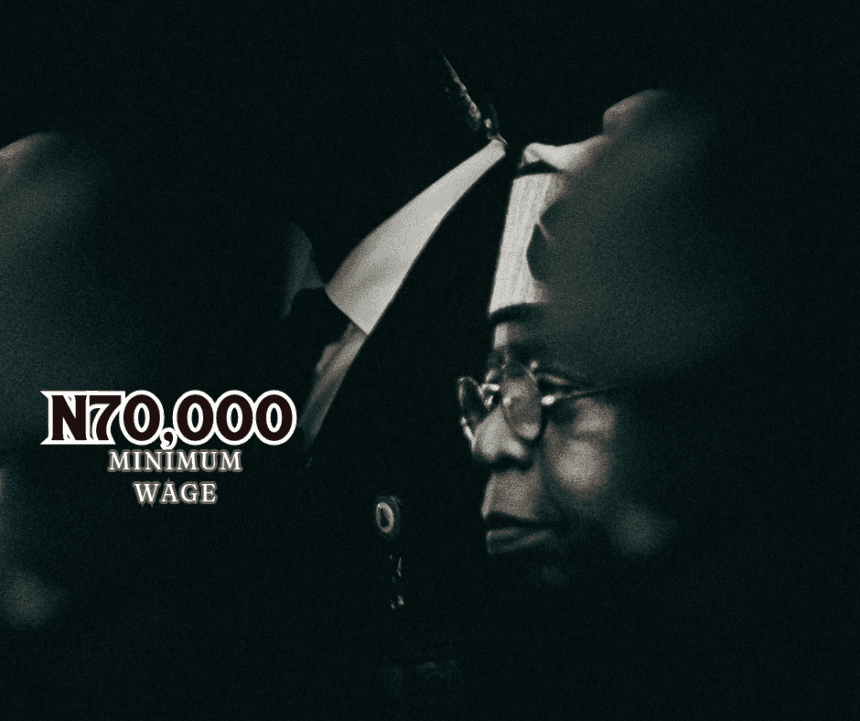Oredola Adeola
In a significant development following extensive negotiations, President Bola Tinubu has approved a new minimum wage of N70,000 for Nigerian workers.
This decision was announced during a meeting between the President and Joe Ajaero, Nigeria Labour Congress, NLC president, and Festus Osifo, Trade Union Congress, TUC at the State House Thursday.
Advisors Reports gathered that the meeting marked the second time the parties have convened within a week.
The President also committed to reviewing the national minimum wage law every three years, a move aimed at keeping wages in line with economic realities.
Additionally, he promised to explore measures to assist both the private sector and sub-national governments in meeting the new minimum wage requirements.
In a display of goodwill, President Tinubu pledged to use his discretionary powers to address the demands of university unions, who have been advocating for the payment of unpaid salaries spanning four months.
Background: A Struggle Amidst Economic Challenges
The journey to this landmark decision has been fraught with challenges.
The agitation for a salary increase by Nigerian workers has its roots in the country’s rising inflation and the recent removal of the petrol subsidy, which have both severely impacted the cost of living.
Nigeria has been grappling with a steady rise in inflation over the past few years, exacerbated by global economic pressures and local policy changes.
Essential goods and services have become increasingly expensive, eroding the purchasing power of the average Nigerian worker. As a result, the demand for higher wages has become more urgent.
Removal of Petrol Subsidy
The removal of the petrol subsidy, a long-standing policy that kept fuel prices artificially low, was implemented as part of broader economic reforms aimed at reducing government expenditure and encouraging investment in the energy sector.
However, this move led to a significant increase in fuel prices, further straining household budgets and sparking widespread discontent among workers and the general populace.
Waves of Strikes and Protests
In response to these economic pressures, Nigerian workers, led by the TUC and NLC, embarked on a series of strikes and protests.
These industrial actions sought to draw attention to the deteriorating living conditions and to demand immediate government intervention. The strikes disrupted various sectors, including education, healthcare, and public services, highlighting the urgent need for a comprehensive response from the government.
Government Response and Negotiations
The initial response from the government was measured, as officials sought to balance the demands of the workers with the need for economic stability.
However, the persistence and unity of the labour unions, coupled with the visible impact of the strikes, led to a series of high-level meetings between union leaders and government representatives.
President Tinubu’s engagement with the labour unions has been pivotal.
Known for his pragmatic approach to governance, he facilitated open dialogues aimed at finding a sustainable solution to the workers’ demands.
His commitment to reviewing the minimum wage law every three years is seen as a proactive measure to prevent future agitations and to ensure that wages keep pace with economic changes.
The Meeting that Sealed the Deal
The decisive meeting in Abuja, attended by leaders of the TUC and NLC, was marked by a spirit of cooperation and mutual respect.
President Tinubu’s announcement of the N70,000 minimum wage was met with applause from the labour leaders, who acknowledged the President’s “fatherly gesture” and his efforts to address their concerns comprehensively.
Looking Ahead
With the new minimum wage set to take effect, attention now shifts to its implementation.
Ensuring that both the public and private sectors adhere to the new wage structure will be crucial.
The government’s promise to support sub-national entities in meeting the wage requirements is a positive step, but the specifics of this support will need to be clearly defined and effectively executed.
Furthermore, addressing the demands of university unions and other sectoral grievances will be essential in maintaining industrial harmony.
The commitment to pay unpaid salaries of university staff highlights the government’s recognition of the importance of the education sector and its role in national development.
The approval of the N70,000 minimum wage by President Bola Tinubu marks a significant victory for Nigerian workers and sets a precedent for future wage negotiations.
It reflects a responsive government willing to engage with its citizens and address their legitimate concerns.
As Nigeria navigates its economic challenges, the ongoing collaboration between the government and labour unions will be key to ensuring stability and progress for all.




